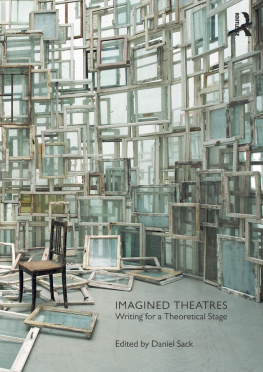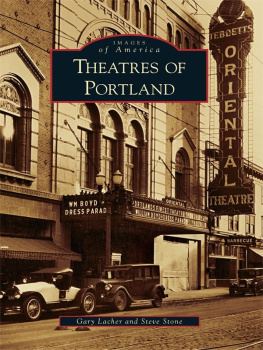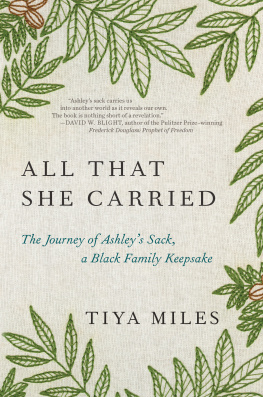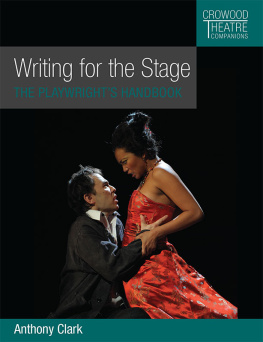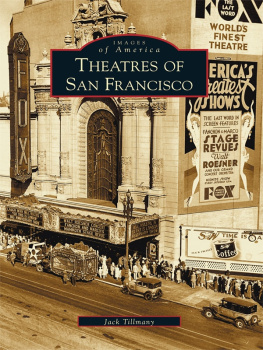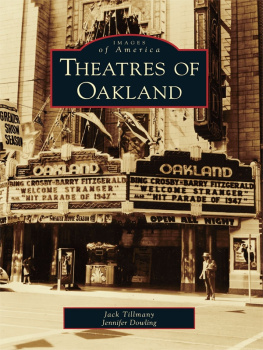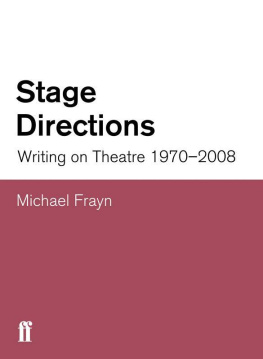Sack - Imagined theatres: writing for a theoretical stage
Here you can read online Sack - Imagined theatres: writing for a theoretical stage full text of the book (entire story) in english for free. Download pdf and epub, get meaning, cover and reviews about this ebook. City: Milton Park;Abingdon;Oxon;New York, year: 2017, publisher: Taylor and Francis;Routlege, genre: Romance novel. Description of the work, (preface) as well as reviews are available. Best literature library LitArk.com created for fans of good reading and offers a wide selection of genres:
Romance novel
Science fiction
Adventure
Detective
Science
History
Home and family
Prose
Art
Politics
Computer
Non-fiction
Religion
Business
Children
Humor
Choose a favorite category and find really read worthwhile books. Enjoy immersion in the world of imagination, feel the emotions of the characters or learn something new for yourself, make an fascinating discovery.
- Book:Imagined theatres: writing for a theoretical stage
- Author:
- Publisher:Taylor and Francis;Routlege
- Genre:
- Year:2017
- City:Milton Park;Abingdon;Oxon;New York
- Rating:4 / 5
- Favourites:Add to favourites
- Your mark:
- 80
- 1
- 2
- 3
- 4
- 5
Imagined theatres: writing for a theoretical stage: summary, description and annotation
We offer to read an annotation, description, summary or preface (depends on what the author of the book "Imagined theatres: writing for a theoretical stage" wrote himself). If you haven't found the necessary information about the book — write in the comments, we will try to find it.
Sack: author's other books
Who wrote Imagined theatres: writing for a theoretical stage? Find out the surname, the name of the author of the book and a list of all author's works by series.
Imagined theatres: writing for a theoretical stage — read online for free the complete book (whole text) full work
Below is the text of the book, divided by pages. System saving the place of the last page read, allows you to conveniently read the book "Imagined theatres: writing for a theoretical stage" online for free, without having to search again every time where you left off. Put a bookmark, and you can go to the page where you finished reading at any time.
Font size:
Interval:
Bookmark:

What possible and impossible worlds might the theatre imagine?
In what way is writing itself a performance?
How do we understand the relationship between real performances that engender imaginary reflections, and imaginary conceptions that become real theatrical productions?
Imagined Theatres collects hypothetical performances written by nearly one hundred leading theorists and artists of the contemporary stage. These dramatic fragments, prose poems, and microfictions describe imaginary events that put theory itself onstage. Each no longer than a page, and accompanied by a reflective gloss, these texts consider what might be possible and impossible in the theatre.
Daniel Sack is Assistant Professor in the English Department and Commonwealth Honors College at the University of Massachusetts Amherst.
Like Calvinos Invisible Cities , Sacks Imagined Theatres are mirages for the minds eye, creations by leading artists and scholars that speak of stages that never were but may yet bean editorial and critical tour de force.
Joseph Roach, Sterling Professor of English, African American Studies, American Studies, and Theater at Yale University.
Imagined Theatres invites us to envision theatre as a utopic no place of infinite possibility, in which theory and practice conjoin in a liminal space of creative imagining. Sack brings together contemporary theatre and performances brightest artist/thinkers in a constellation of words and images, ideas and propositions that give me hope, not just for the theatre, but for how human beings might interact, relate, and connect in ways that performance helps us conjure. An inspired collection for precarious times.
Jill Dolan, Dean of College and Annan Professor of English and Professor of Theater at Princeton University.
Writing for a theoretical stage
Edited by Daniel Sack

First published 2017
by Routledge
2 Park Square, Milton Park, Abingdon, Oxon OX14 4RN
and by Routledge
711 Third Avenue, New York, NY 10017
Routledge is an imprint of the Taylor & Francis Group, an informa business
2017 selection and editorial matter, Daniel Sack; individual chapters, the contributors
The right of Daniel Sack to be identified as the author of the editorial material, and of the authors for their individual chapters, has been asserted in accordance with sections 77 and 78 of the Copyright, Designs and Patents Act 1988.
All rights reserved. No part of this book may be reprinted or reproduced or utilised in any form or by any electronic, mechanical, or other means, now known or hereafter invented, including photocopying and recording, or in any information storage or retrieval system, without permission in writing from the publishers.
Trademark notice : Product or corporate names may be trademarks or registered trademarks, and are used only for identification and explanation without intent to infringe.
British Library Cataloguing in Publication Data
A catalogue record for this book is available from the British Library
Library of Congress Cataloging in Publication Data
A catalog record for this title has been requested
ISBN: 978-1-138-12204-8 (hbk)
ISBN: 978-1-138-12205-5 (pbk)
ISBN: 978-1-315-26495-0 (ebk)
Typeset in Bembo by
Servis Filmsetting Ltd, Stockport, Cheshire
Visit the website at www.imaginedtheatres.com
In memory of Robin Joy Allan and all her imagined theatres.
Daniel Sack
The curtain opens endlessly;
it does not stop at the prosceniums
jamb, but instead runs on.
What you assumed a line splitting
open the frame of a thought is but the
tangent of a larger encompassing circle
describing the outer curve of your attention.
The sound of the tracks recede into what
you called offstage, farther and further
afield, a train dividing the great dark plains
into what is still the theatre and yet
already becoming not the theatre.
In what other houses do those other people sit,
patient for the slow progress of the veil
to reveal their night has truly begun?
Tragedy is all a matter of scale, said Aristotle:
You must be able to hold the event in memory
or take its full shape in with a single glance.
Indefinitely, on the most distant horizon,
the curtain is coming around at the other
side of sight, inverting itself like a
crimson velvet ouroboros.
You think you see it opening still:
this life here and now, appearing.
One of the innumerable imagined theatres this book does not contain tells the story of a performance that ends, like many theatrical performances, with a curtain call. After all the actors have had their bow, the stage hands begin to emergeone by one or holding hands in pairs, squinting at the light. They keep coming as the audiences clapping turns insistent, as the stage fills and they spill over into the orchestra, down the aisles, and out into the lobbythose countless hidden bodies whose labor made the show possible. As if having traveled from far away, from the edges of a theatre that extends to towns or countries unseen, it takes many hours for the last to make their way to the boards. The last hand that moved the theatre bows as dawn brightens the city streets.
Great hosts from near and far have sustained this book, too. Without keeping you here until morning with a list too long to name, a few figures deserve attention: Jane Hwang Degenhardt, LeAnn Fields, Peggy Phelan, Alexandra Ripp, Rebecca Schneider, Jenny Spencer, and Silvia Valisa. Special thanks to Kyle Gillette and Aaron C. Thomas for close readings and outside eyes when I needed them most. Also to Ellie Kevorkian, the Liveness is Critical residents, and the entire staff at the Bemis Center for Contemporary Arts for encouragement at an important moment in the process.
Different iterations of Imagined Theatres were presented at Summerhall in Edinburgh, Florida State University, Hampshire College, Harvard University, the Five College Performance Studies Working Group, the Interdisciplinary Studies Institute at the University of Massachusetts Amherst, and conferences organized by Performance and Philosophy, the American Society for Theatre Research, the Association for Theatre in Higher Education, the American Comparative Literature Association, and the Interdisciplinary Performance Studies at Yale Crossings conference.
Thanks to Reiko Ishiguro at the 21st Century Museum of Contemporary Art, Kanazawa, for assistance with permissions, and the artist Chiharu Shiota for the use of her work. Coach House Books kindly allowed the reprint of texts from Jonathan Balls Clockfire . Selections from my introduction were first published in a different form in Theater magazine (Winter 2015) under the editorship of Tom Sellar, and the preface initially found its way to print in the pages of the poetry and prose journal Parcel . Ten of the imagined theatres and glosses collected under the constellation of Technology were published in the Fall 2016 issue of Theatre Journal . Editors Jennifer Parker-Starbuck and Joanne Tompkins were helpful interlocutors here and elsewhere.
This project was made possible with the generous support of a Faculty Research Grant/Healey Endowment Grant from the University of Massachusetts Amherst. Students and colleagues at my home institution have been supportive throughout, but two people were especially instrumental in their assistance. Tom Racine offered a steady hand with a mountain of invoices and all manner of convoluted tax forms. I cannot put words to the gratitude I owe my assistant Patricia Matthews, a brilliant doctoral student in the Department of English. With a precision of thought and a feel for language I can only admire, she has been the most reliable and inspiring of collaborators.
Font size:
Interval:
Bookmark:
Similar books «Imagined theatres: writing for a theoretical stage»
Look at similar books to Imagined theatres: writing for a theoretical stage. We have selected literature similar in name and meaning in the hope of providing readers with more options to find new, interesting, not yet read works.
Discussion, reviews of the book Imagined theatres: writing for a theoretical stage and just readers' own opinions. Leave your comments, write what you think about the work, its meaning or the main characters. Specify what exactly you liked and what you didn't like, and why you think so.

